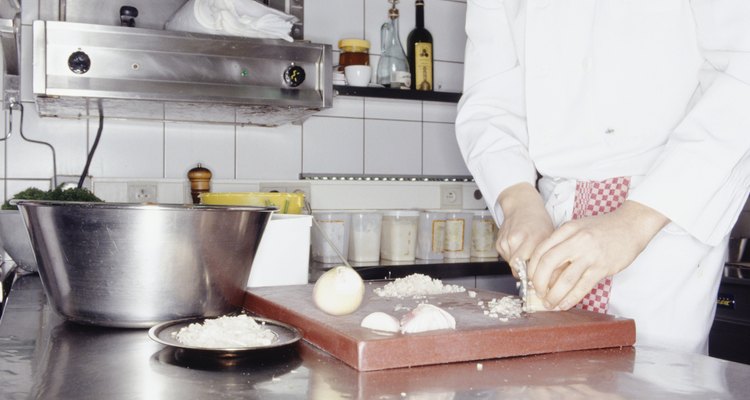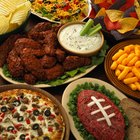
David De Lossy/Photodisc/Getty Images
It was legendary French chef Auguste Escoffier who first established the Brigade de Cuisine hierarchy, assigning specific, if repetitive, tasks to each cook. Recreating the finely tuned synchronization of a restaurant kitchen at home helps eliminate the duplication of tasks and possible confusion about the progress of each dish. This can be especially useful during the preparation of a holiday meal or dinner party. Follow the principles of the commercial kitchen so many hands can make light work, rather than letting too many cooks spoil your broth.
Importance of a Head Chef
Just as a commercial kitchen has an executive chef, head chef or sous chef, a domestic kitchen needs an overall supervisor to guide the passage of each dish from raw ingredients to plating. A single voice is crucial in timing the assembly of dishes and their sauces, functioning like an orchestral conductor by combining the diverse parts to make a whole. Let the person who devised the menu take charge and assign supporting tasks to any helpers.
Stay Safe
According to FEMA, the leading cause of kitchen fires is unattended cooking pots on the stove. Designate one person to supervise pots and make sure that each member of the home kitchen crew knows what to do in the event of a fire. Likewise, moving around the kitchen with pots of hot oil or scalding water can be especially dangerous when you have multiple people working together to prepare a meal. Warn others before you move, and wait to hear their acknowledgment. Knives pose a particular hazard. Take responsibility for the knives you use and don’t leave them on the edge of a counter or submerged in water where someone else might reach in and cut himself.
Know Your Job
A group that follows distinct individual roles performs better than one in which cooks consistently encroach upon each other’s tasks to lend their advice and expertise. In this case, the adage “too many cooks” holds true. Identify one person responsible for prepping vegetables and other sides, for example, while another works at the stove. You could designate a third person to make a salad or prepare other uncooked items such as dinner rolls.
Specialist Roles
Certain key roles within the kitchen team should be reserved for the most experienced cooks. Just as the commercial grill chef takes responsibility for the timing of roasts, steaks and possibly stove-top sautéing, your home kitchen team should have just one cook take care of the meat. Depending on the space available to you, one or more additional cooks can assume responsibility for the sides and dessert.
Related Articles

What Is a Hibachi Restaurant?

Dinner Party Ideas for 12 People

How to Sanitize Cooking Utensils With ...

Groom's Table Decorating Ideas

Domino's Bread Bowl Pasta Nutrition ...

Children's Activities for Pastor ...

How to Become a Chef for Kids

Tips for Catering a Wedding Reception ...

Appreciation Dinner Ideas

How to Cater Your Own Party

How do I Make Taco Salad Bowls From ...

What Is the Cultural Etiquette at ...

How to Display Food Names at a Party

How to Make Dinners Ahead of Time Using ...

How to Convert Stovetop Recipes to ...
How to Plan a Family Reunion

How to Cook Beef in a Toaster Oven

How to Hire Caterers in Culinary Schools

How to Bake With a Roaster

Table Game Ideas for a Team Building ...
References
Resources
Writer Bio
Nick Marshall is a UK-based writer specializing in trends and best-practice in the B2B sector.
Photo Credits
David De Lossy/Photodisc/Getty Images